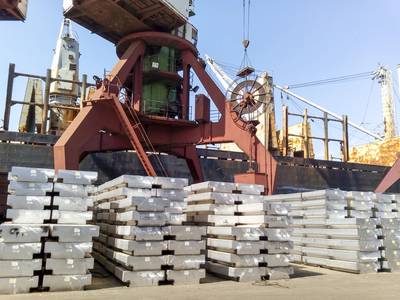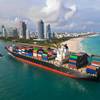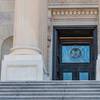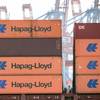Trump Tariffs: EU Seeks Permanent Exemption
European Union leaders called on Friday for a temporary exemption from U.S. import duties on steel and aluminium to be made permanent, saying they reserved the right to respond in an "in a proportionate manner" to protect the bloc's interests.
The 40-day exemption granted by Washington was like U.S. President Donald Trump "putting a gun to our head", Belgium's prime minister complained. The EU's trade negotiator demanded that the United States drop "artificial deadlines".
Trump said on Thursday he would suspend tariffs for the EU, the United States' biggest trading partner, as well as Argentina, Australia, Brazil, Canada, Mexico and South Korea. The tariffs are suspended until May 1 as discussions continue.
In a joint statement, EU heads of state and government, meeting for a regular summit in Brussels, said the measures could not be justified on national security grounds -- the basis cited by Washington.
"The European Council regrets the decision by the United States to impose import tariffs on steel and aluminium," they said. "Sector-wide protection in the U.S. is an inappropriate remedy for the real problems of overcapacity."
"The European Council strongly supports the steps taken by the Commission to ensure that the interests of the EU are fully protected and to reserve its rights, in compliance with World Trade Organisation rules, to respond to the U.S. measures as appropriate and in a proportionate manner."
Cecilia Malmstrom, the trade commissioner who negotiates on behalf of the 28 nations, said Europeans did not want to be penalised by actions prompted largely by accusations of Chinese dumping and said Washington and Brussels should be cooperating.
"The U.S. and EU should be tackling such issues together. We now look forward to pursuing a dialogue with the U.S. on trade issues of common concern, such as global steel overcapacity," she said on Twitter.
"These discussions between allies and partners should not be subject to artificial deadlines."
British Prime Minister Theresa May told reporters in Brussels that Europe would now work to see how a permanent exemption could be secured.
French and German officials welcomed Trump's decision to spare European industry.
The exemption from tariffs followed Malmstrom's trip to Washington for talks with U.S. Trade Representative Robert Lighthizer and Commerce Secretary Wilbur Ross.
Europe says it wants to avert a trade war but on Friday its leaders warned Trump they would respond with counter-measures if the White House proceeded with higher barriers on U.S. metals in May.
The European Commission has proposed that, if tariffs are eventually imposed, the bloc should challenge them at the World Trade Organization, consider measures to prevent metal flooding into Europe and impose import duties on U.S. products to "rebalance" EU-U.S. trade.
The Commission's Malmstrom said the EU was keeping its options open.
Countermeasures could include EU tariffs on U.S. oranges, tobacco and bourbon. Harley-Davidson Inc motorcycles have also been mentioned, targeting Republican U.S. House of Representatives Speaker Paul Ryan’s home state of Wisconsin.
Austrian Chancellor Sebastian Kurz said the EU did not want a trade war but would respond "firmly" if the president took "the wrong decision".
Belgian Prime Minister Charles Michel underlined the irritation among some EU leaders at Trump's negotiating tactics.
"I have the impression that the U.S. leader wants to negotiate with the European Union by putting a gun to our head," Michel said as he arrived at the EU summit.
"That's a strange way to negotiate with an ally."
(Writing by Richard Lough; editing by Noah Barkin and Philip Blenkinsop)
(Writing by Richard Lough; editing by Noah Barkin and Philip Blenkinsop)












